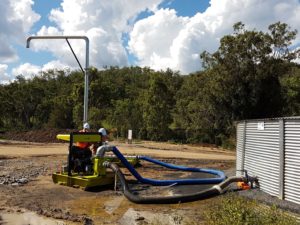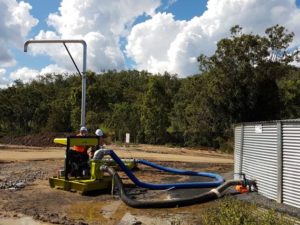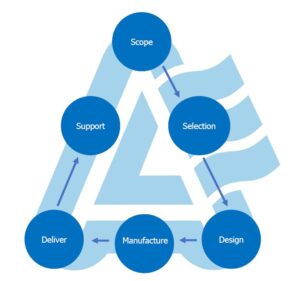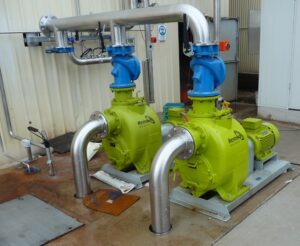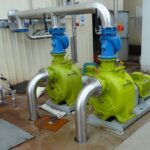Quarrying allows us to uncover and use the very foundations of what our society is built upon: stone, slate, construction sand, gravel, quarry rock and other raw construction materials. However, quarries are difficult, sometimes dangerous, places to work. Safely removing water and moving chemicals is vital to quarry work. The right equipment is essential to ensure the safety of all those who work within quarries and to maintain the integrity of what these workers extract. This is where pumps can be of great use.
1. Centrifugal Pumps – The Multi-talented
Quarrying involves various materials pumped and transferred. Therefore, multi-talented and versatile equipment can aid streamlining the work process and maintain a high safety standard within the workplace.
Centrifugal pumps are a versatile, tough pump used to transport fluids by transforming rotational energy to hydrodynamic energy. Although commonly used for water sewerage and petroleum, centrifugal pumps are very versatile and can be used for various other purposes. They can pump water and dewater areas, unload tankers, complete general transfers of fluids, act as pressure systems, as well as pump waste water, oils and hydrocarbons, acids and chemicals. This pump is adaptable to your needs and can pump almost anything you need it to, making it perfect for the quarry.
2. Dewatering Pumps – The Specialists
To ensure things are done properly, sometimes it is necessary to involve specialists. The process of dewatering involves taking and removing the water from a construction site, mine shaft, quarry, construction site, a riverbed, or any other area in need of dewatering. Extracting water from a quarry is vital in maintaining a safe work environment for workers and to avoid any expensive delays. In the event dewatering is a frequent issue, using specialist equipment is an effective means to carry out work efficiently, as it reduces the amount of equipment needed given its specialised nature.
One of the most commonly used pumps to aid in dewatering is a submersible pump. These pumps boost the ability to handle pumping not only water, but also grey water, sewerage, industrial waste, chemicals and even solid food products. This device pushes fluid to the surface rather than pull it making it more efficient means to pump water.
Submersible pumps come in various types, including grinder, vortex and cutter pumps with low flow, high flow, high head and low head options. If the submersible pump is not suitable, there are other pumps that can also meet your dewatering needs including self-priming pumps, trash pumps and auto prime pumps.
3. Dosing and Metering Pumps – The Slow and Steady’s
When dealing with chemicals and acids, the greatest of care is needed to ensure not too much or too little is given. Measuring the substances ensures not only that the correct quantity is used, but also but also that there is little to no wastage of the materials. Advanced diaphragm metering pumps can be used to accurately and reproducibly provide dosing of acids and chemical liquids. The flow rate can be adjusted by either adjusting the stroke length or by the pulses. These pumps also have a number of smart functions that allow users to operate them with ease. Dosing and metering is crucial when dealing with hazardous or potentially hazardous chemicals and substances to prevent injury and misuse.
4. Slurry Pumps – The Tough
In a tough line of work, tougher equipment is needed to carry out the work. Slurry pumps are just that- used to transfer thick, corrosive and abrasive materials as well as some chemicals and solid materials. Typically, they come in a submersible, centrifugal, lobe or peristaltic style of pump. A slurry pump is commonly made of iron that’s thick and durable to ensure that even the harshest of materials won’t cause it any damage.
5. Stand Pipe Packages – The Dust Minimiser
Extracting resources from the earth is no doubt dirty and dusty work. When transporting the materials, dust needs to be minimised as an excess of dust can be hazardous to other drivers. Dampening the materials can help reduce this hazard. Water can also help to prevent the loss of certain products including sand. Standpipe pump packages can be installed to be either a temporary or permanent solution at not only quarry sites but also sites for other mining and construction.
The conditions and the work are tough at Quarries. Working in such conditions calls for high quality equipment to ensure the safety of workers and the integrity of the extracted materials remaining intact.


















































































